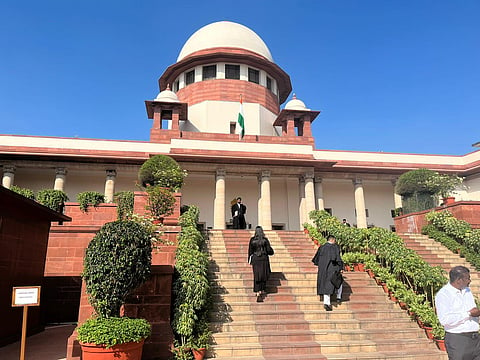

NEW DELHI: The Supreme Court on Wednesday said the Centre’s electoral bonds scheme “provide (only) selective anonymity... confidentiality” as its purchase records are available with the State Bank of India (SBI) and can be accessed by investigative agencies.
Hearing petitions challenging the legal validity of the electoral bonds scheme for the second day, a five-judge constitution bench headed by Chief Justice DY Chandrachud noted that the problem with the scheme would be if it does not provide a level playing field to political parties and if it suffers from opacity.
Under the Central scheme, which was introduced in the Finance Act, 2017, electoral bonds can be issued or purchased from some authorised branches of the SBI. A major contention of the petitions against the scheme was that the identity of the donors could never be known to the public. “The problem with the scheme is it provides for selective anonymity. It is not completely anonymous. It provides for selective anonymity, selective confidentiality ... It is not confidential qua the State Bank of India. It is not confidential qua the law enforcement agencies,” the top court observed.
The bench also comprising Justices Sanjiv Khanna, BR Gavai, JB Pardiwala and Manoj Misra said that the motive behind the scheme may be perfectly laudable but in an effort to bring in white money into the electoral process, it essentially provides for a “complete information hole”.
Justice Khanna said one of the issues was selective confidentiality and it may be easier for the party in power to get the information about the electoral bonds. He said because of selective confidentiality, the opposition parties may not know who the donors are but the donors of the opposition parties may be identified at least by the probe agencies.
In continuation to the earlier arguments that the scheme was confidential in nature, Solicitor General of India (SG) Tushar Mehta, on behalf of the Centre, told the Supreme Court that donations made through electoral bonds are kept anonymous to protect the privacy and political affiliation of the citizens who make such donations to political parties. The SG said each and every word was very consciously used and what the petitioners have called “anonymity or opaqueness” was neither anonymous nor opaque but was “confidentiality by design”.
Also in top court
‘Review same-sex marriage verdict’
A petition has been filed in the Supreme Court seeking a review of its October 17 verdict, by which a five-judge constitution bench headed by the Chief Justice of India had refused to accord legal recognition to same-sex marriage. The review plea by one of the petitioners, Udit Sood, has been filed with the SC registry.
Teesta told to cooperate with cops
A three-judge bench headed by Justice SK Kaul on Wednesday directed activist Teesta Setalvad and her husband Javed Anand to cooperate with Gujarat Police probing a case of an alleged misappropriation of funds against them. The court, however, refused to interfere with the anticipatory bail it had granted Setalvad.